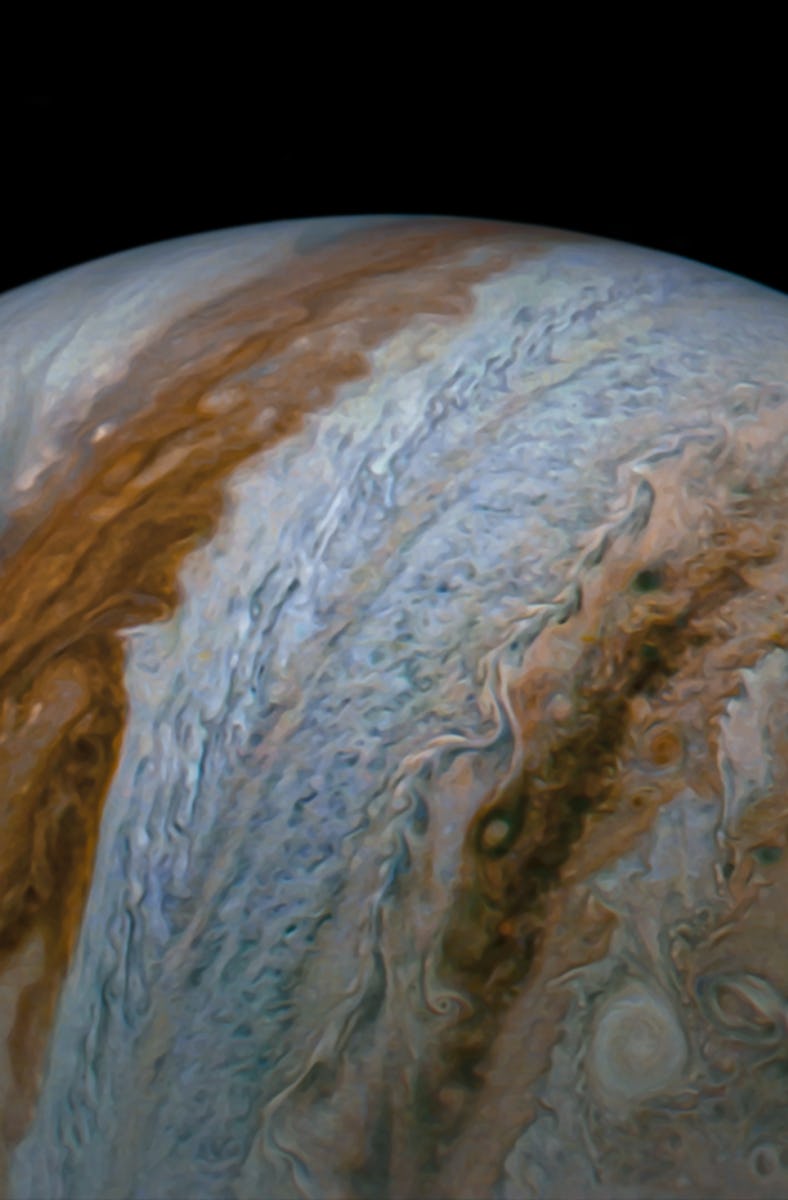NASA’s Juno Spacecraft Spotted A Mysterious Phenomenon Buried Beneath Jupiter’s Atmosphere
Juno’s investigation of Jupiter has “some of the best data” on the science of magnetic fields.

When NASA’s Juno spacecraft pointed a sensitive instrument toward the belly of the largest planet in the Solar System, it detected something peculiar: A jet hidden deep below Jupiter’s atmosphere. As it turns out, this wind of highly dense gas could help explain how the universe itself functions.
Juno’s investigation of Jupiter has “some of the best data” on the science of magnetic fields, Scott Bolton, Juno principal investigator and co-author of a new study published Wednesday in the journal Nature, tells Inverse.
Rocky planets like Earth, gas giants like Jupiter, and even high-octane environments like black holes all produce magnetic fields. In their most rudimentary form, they resemble classic physics lessons where iron filings organize themselves into loops when they’re in the presence of a bar magnet. The Sun has a more complex magnetic field than this today, and probably had a giant magnetic field, too, when the Solar System was taking shape. The solar magnetic field was probably a very important player in how our cosmic neighborhood came to be, as it dictated the motion of charged particles and dust, Bolton says.
Jupiter’s heart is under a lot of pressure
Jupiter is a special laboratory. Earth’s magnetic field, which is generated by the churning liquid core deep inside our planet, is fascinating for many reasons. It directs the motion of charged particles from space, fosters auroras near the poles, and most importantly creates the life-friendly shield that protects living things from harmful cosmic radiation.
But Earth’s crust is a major barrier to studying it, Bolton says. That’s where Jupiter helps out.
“The origin of the Earth's magnetic field has been an area of scientific research, and speculation, for hundreds of years. By studying other planets, we hope to inform our understanding not just of those other planets, but of the Earth, too,” Jeremy Bloxham, the study’s lead author and geophysics professor at Harvard University, tells Inverse via email.
Jupiter’s magnetic field is easier to dissect. The planet isn’t rocky, but gaseous. Instruments have better luck peering inside, to search for clues about the powerful cosmic hearts that make magnetic fields.
Jupiter’s magnetic field is likely generated by helium and hydrogen under incredible pressures that make the gas molecules act like a syrupy liquid metal.
his still from an animation illustrates Jupiter’s magnetic field at a single moment in time.
Juno’s fluxgate magnetometer observed a sluggish jet buried deep inside Jupiter, moving at just around 1 centimeter a second (compared to the atmospheric jets closer to the cloud tops zipping by at 100 meters per second), made of this metallic hydrogen.
To learn about Jupiter’s strange guts, the paper’s scientists looked for changes over time. The Juno probe found that this jet, near Jupiter’s equator, fluctuated in strength with a period of about four years. Noticing this detail was something that could only be gleaned by Juno’s two T’s: technology and time.
Juno, now on an extended mission that will last until at least September 2025, has eight years of Jovian exploration under its belt. This jet fluctuation period of four years could be associated with the dramatic happenings deeper inside the planet. It’s likely a fingerprint of Jupiter’s inner, high-pressure turmoil.
The big picture
The study is yet another step towards understanding the physics of magnetic fields throughout the universe, which still guard many of their secrets.
“When Juno was conceived we had high hopes for what it would reveal about Jupiter. It has vastly exceeded our expectations, not just regarding the planet's magnetic field, but in many other aspects, too. And Juno is still going strong,” Bloxham says.
The goal, ultimately, is a big picture. According to Bolton, the magnetic field that Jupiter creates is similar to what we see throughout space.
“It has to do with the creation of planets, stars, galaxies, quasars. I mean, it’s almost the creation of the universe and how nature is ordered throughout the universe. The magnetic field plays a very important role in how they’re created and what’s going on. So it’s a very fundamental force that has a lot of implications on how the universe works,” Bolton says.